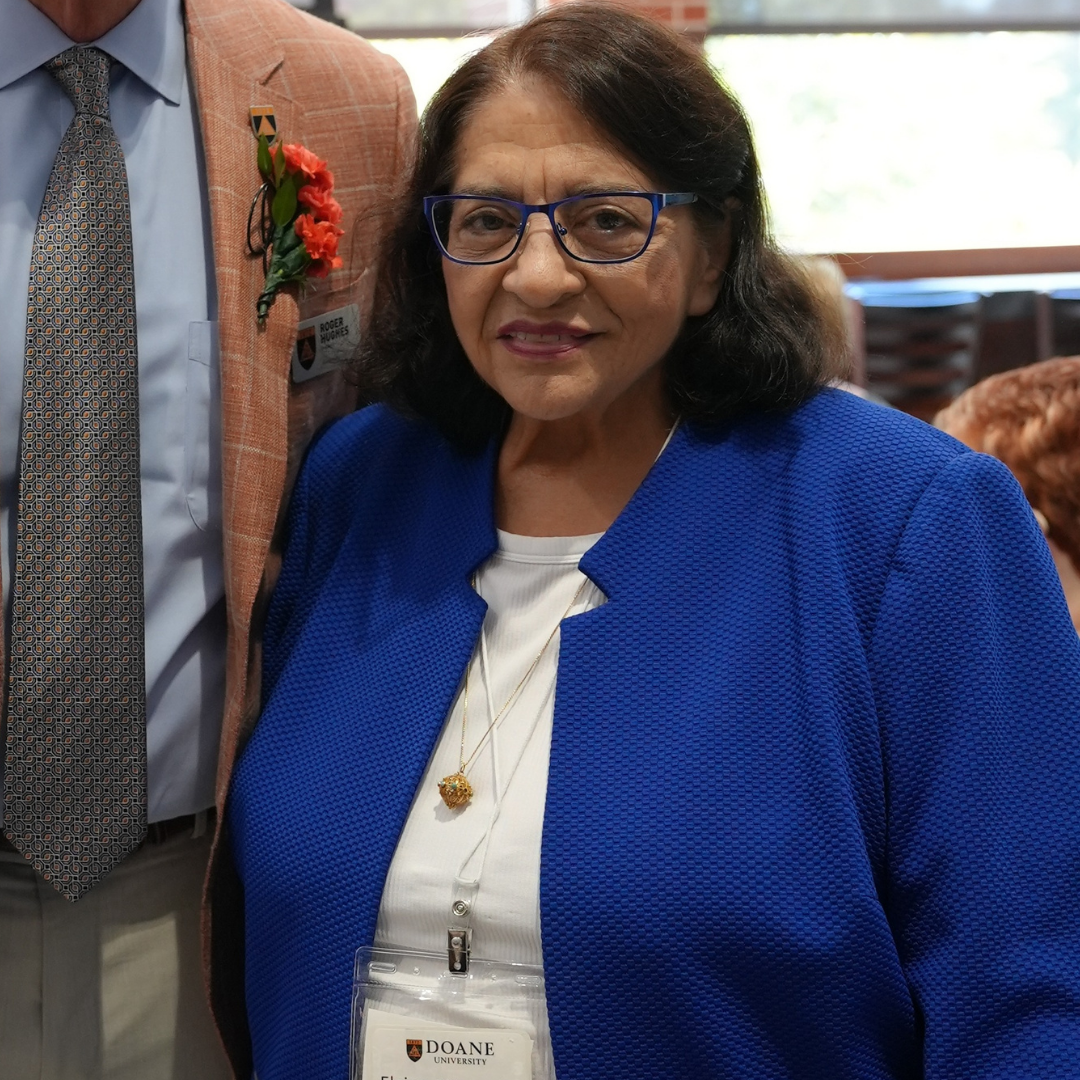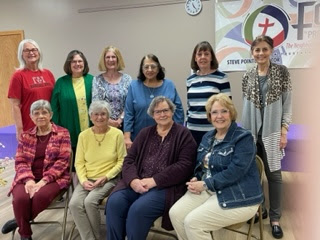If you or someone you know is experiencing domestic violence, the National Domestic Violence Hotline is available to help. You can call 1.800.799.SAFE (7233); text "START" to 88788; or live chat with an advocate.

Elaine D’Amato rolled up to then-Doane College with her parents and a trailer hitched to their car. It was 1967. Like many 18-year-olds, D’Amato applied to colleges that were far from home. Home was Massachusetts. Nebraska was far and Doane looked nice enough in the brochure. It quickly became her new home.
She joined Gamma Phi Iota sorority and the Owl, served as a resident assistant (RA) in Frees Hall her senior year, and was elected to Student Congress.
For one of her Owl assignments, she interviewed retired Supreme Court Justice Thomas “Tom” Clark who had visited campus as a guest speaker. D’Amato chuckles at it now as a funny coincidence knowing her future path into law. But back then, D’Amato was a sociology major with no thoughts toward law school.
After graduating from Doane in 1971, D’Amato earned her master of social work degree from the University of Kansas in 1973. For nearly two decades she helped adults, foster children, handicapped individuals and others as a social worker.
She married, had a daughter and moved to Florida to be near her retired parents. What seemed like a content life was anything but. Her husband abused her throughout their 14-year marriage.
“I took the abuse for many years, serious abuse,” D’Amato said. “And then, of course, didn't tell anybody. Which is what a lot of people do, they don’t tell people.”
She’d walk into work with a split lip, black eye and bruises.
“I told people that I got in a car accident because I was embarrassed to tell them that my husband punched me in the face,” D’Amato said.
Any further comments would have a perfect explanation. Well your car looks fine, they’d say. I was driving my mom’s car, D’Amato would reply. The turning point for D’Amato came when her husband’s abuse turned to their dog and four-year-old daughter.
“The next day I went and filed for divorce,” D’Amato said.
While we all just celebrated D’Amato’s bravery and independence, she wasn’t free. Not yet, anyway.
The abuse D’Amato experienced was a non-starter in court.
“My divorce lawyer even told me, ‘I really can't bring up this abuse stuff to the judge, because your husband's not some drunk that works some crummy job and goes to the bars and gets drunk and then comes home and beats you up,’” D’Amato said. “‘He's a businessman. He's a well-respected businessman. The judge is not going to believe that he battered you.’ Your lawyer, whom you're paying, is telling you this.”
She didn’t bring up her abuse again until a year later. D’Amato had gotten into law school, two actually, the University of Nebraska-Lincoln and Creighton University, and she wanted, nay needed, to go.
D’Amato had friends from Doane who lived in Omaha (where Creighton is located). Former Doane President Phillip Heckman called both UNL and Creighton law schools on her behalf. Doane had proven it would always be a home for D’Amato.
The desire to leave home and return to Nebraska was more urgent this time than an 18-year-old kid looking for a new adventure. She needed to escape Florida, escape her abusive ex-husband. The possibility of running into him loomed over her. It made her nauseous, she said.
She wasn’t legally allowed to leave the state of Florida with her daughter. Her daughter had to stay within a 50-mile radius of her father — D’Amato’s abuser. The courts sent her and her ex-husband to mediation.
“Mediation is good if the parties are on a level playing field,” D’Amato said. “A battered woman is always at a disadvantage being in the same room as her former abuser. That person has told you for so long that you’re nothing and you believe it. An abuser just looks at their former victim and their control over their victim is restored. Just being in your former abuser’s presence makes you believe all the negative things they’ve said about you for years.”
The mediator sent D’Amato and her ex to a psychologist who met with the ex-couple and their daughter individually. The psychologist recommended D’Amato be allowed to move to Nebraska with her daughter.
“You had to have a professional person say it, just me saying it didn't matter,” D’Amato said.
Two weeks before law school started, D’Amato rolled up to Creighton with her mom, daughter, pet pigeon and cat. Unlike other 40-year-old women, D’Amato would attend law school among 20-somethings while caring for her first-grade daughter as a single parent.
And an abusive ex-husband who wrote to the school demanding her grades. He had no control over her anymore, though. D’Amato was free — and inspired. Her experiences led her to an enriching law career helping women who have been abused. For over 23 years she’s been at Legal Aid of Nebraska. The group provides free civil legal services to low-income individuals.
Having walked a similar path as many of the women she represents, D’Amato shows them that yes, “there is life after abuse.”
It requires therapy and a strong network of friends to lift you up, she said.
D’Amato had her Doane friends, many of whom lived in Omaha. Coleen (Chaney) Vincent ’71 helped D’Amato find a rental house in Omaha for her and her daughter.
“Doane people are just dear, special, kind people,” D’Amato said. “The relationships you forge when you’re at Doane last forever. There’s just not a time limit on it.”

In fact, D’Amato returned to Doane Homecoming for a 50-year reunion. Not her own — she attended hers three years ago — but the fiftieth of her Frees Hall 2nd North freshmen who D’Amato, as their RA, described them as “happy, energetic and somewhat mischievous.”
The trip was a tad longer, as D’Amato recently moved to upstate New York to be near family. Her daughter had a son in April, D’Amato’s first grandchild. She bought him a pumpkin outfit the other day.
She continues to work for Legal Aid, remotely and part time. Yesterday she had a court hearing over Zoom.
“It was hard for me to semi-retire, because I really love my job,” D’Amato said.
Grandma duties will fill up her schedule, as will making her pre-Revolutionary War house her new home.
Even though she’s clocking in fewer hours at Legal Aid, she remains a strong advocate for women, children and men who are abused.
Earlier in the fall, she attended a virtual celebration for the 30th anniversary of the Violence Against Women Act (VAWA). VAWA helps fund women’s shelters, education programs, housing and attorneys for women who are abused.
October is domestic violence awareness month. D’Amato realizes the timing of sharing her story and encourages people to pay attention to their friends, coworkers and family members. While you don’t know what’s going on behind closed doors, “if you see something, say something.”
“I was told by people later, they said, ‘we suspected that everything wasn’t wonderful at your house,’” D’Amato said. “They saw the controlling behaviors.”
“We have to take care of each other and women have to be aware that somebody might be going through a real hell,” D’Amato said.
Help can come in the form of donating women’s, children and baby clothes to a shelter or just knowing what someone’s going through and supporting them through it.
When you believe them, it grants them permission to believe in themselves — and in a better life.
If you or someone you know is experiencing domestic violence, the National Domestic Violence Hotline is available to help. You can call 1.800.799.SAFE (7233); text "START" to 88788; or live chat with an advocate.

